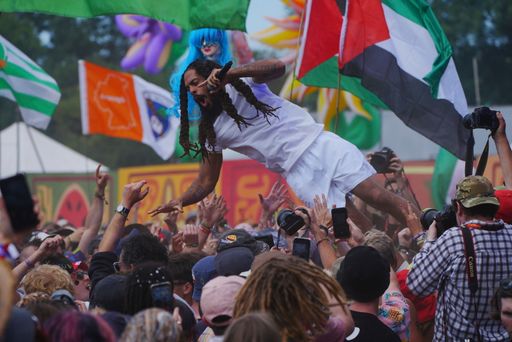In recent years, the Creative Community for Peace (CCFP) has emerged as an increasingly influential force in the US entertainment industry, leveraging its connections within Hollywood to counter criticism of Israel.
CCFP calls itself a nonpartisan, pro-peace organisation composed of artists, producers, and executives that promotes “artistic freedom and constructive engagement.”
But this pro-Israel group has waged a months-long battle against Kneecap, the hip-hop Irish band, which is facing US and UK censure for its criticism of Israel’s genocide of the Palestinians.
It was CCFP that posted pictures of Kneecap’s Mo Chara holding a Hezbollah flag in one of the concerts, which led to Chara facing terrorism charges in the UK. (Chara, a vocal supporter of Palestine, says he didn’t know what the flag represented, and he only took it after someone from the crowd handed it to him.)
CCFP has evolved into a well-organised lobbying platform that actively targets artists, performers, and journalists who speak out against Israeli aggression, seeking to limit their exposure or discredit their voices in Western media.
Here’s a recap of what it has been up to.

The Bisan Owda Emmy campaign
One of the most widely covered events transpired in 2024, when Bisan Owda, a 25-year-old Palestinian journalist from Gaza, was nominated for an Emmy for her work documenting life under Israeli bombardment in the documentary “It’s Bisan From Gaza and I’m Still Alive.”
Soon after the nomination was announced, CCFP spearheaded a campaign calling for her disqualification, alleging ties to the Popular Front for the Liberation of Palestine (PFLP) — a US-designated terrorist group.
The organisation circulated a letter signed by over 150 entertainment industry figures, including prominent names like Selma Blair and Sherry Lansing, urging the National Academy of Television Arts and Sciences to revoke her nomination.
However, after internal review, the Academy stood by its decision, finding no evidence of current extremist ties. Owda later went on to win the Emmy, but the episode marked a high-profile instance of CCFP’s efforts to influence cultural institutions.
Chant at Glastonbury: Visa revocation for Bob Vylan
On Saturday, British punk-rap duo Bob Vylan became the latest targets of cultural and political fallout after leading chants of “free, free Palestine” and “Death to the IDF” at the Glastonbury Festival, during a pro-Palestine performance.
While the US government revoked their visas, citing the glorification of violence, critics noted the swift online mobilisation from groups like CCFP and other pro-Israel advocacy platforms in the days following the performance.
Though no direct lobbying by CCFP has been confirmed in this case, the organisation was quick to publicly denounce the act as “antisemitic hate speech” and urged platforms and festivals to take action — a pattern familiar from its past campaigns.
The BBC later removed the artist’s performance from its archive, the group was dropped by its US talent agency, and a criminal investigation was opened in the UK.
Strategic playbook: From cultural boycott to career consequences
The CCFP was formed in 2011 as a direct counter to the Boycott, Divestment, and Sanctions (BDS) movement, which had gained momentum in urging international artists to cancel performances in Israel.
In its early years, the group concentrated on rallying support for artists like Madonna, Radiohead, and Nick Cave, who rejected boycott calls and went ahead with concerts in Tel Aviv.
As time passed, CCFP’s approach evolved beyond public backing of performances. Its strategy has grown into a broader effort to counter and discredit voices critical of Israeli government policies, particularly within the entertainment and media industries.
This now includes organising open letters and sign-on campaigns against films, television shows, or speakers they view as hostile to Israel.
It also mobilises pressure on social media to influence event organisers, festival programmers, awards juries, and engages in behind-the-scenes lobbying with executives and publicists to discourage professional support for outspoken Palestinian advocates.
In doing so, CCFP has positioned itself not only as a defender of Israel in the cultural sphere but also as a powerful actor capable of shaping which voices are amplified — and which are sidelined — within the creative industries.
The pushback
Critics of CCFP — including human rights organisations and pro-Palestinian advocacy groups — argue that its campaigns blur the line between combating antisemitism and silencing legitimate political dissent.
In particular, they warn that equating criticism of the Israeli military with hate speech can be used to shut down Palestinian perspectives entirely.
As the humanitarian crisis in Gaza continues and international concern grows over Israeli military aggression, the battle over public narrative is increasingly being fought not just in headlines but on red carpets, festival stages, and awards ballots.
At the centre of this struggle stands CCFP, which is doing cultural gatekeeping for Israel.



















